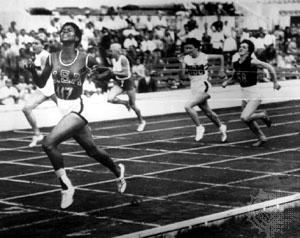 Wilma Rudolph was a great African American track star athlete. She won three gold
medals in a single Olympics.
Wilma Rudolph was a great African American track star athlete. She won three gold
medals in a single Olympics.
Wilma Rudolph was born in 1940 in Bethlehem, Tennessee. The 20th out of 22 children, she was the only one born with polio and suffered from serious bouts of pneumonia and scarlet fever
as a young child. All these ailments contributed to a bad leg that many said would prevent her from walking, but Wilma had a loving family who made sure she got medical attention. Wilma
wore a leg brace from the time that she was five years old until she was 11. Then, one Sunday, she removed her brace and walked down the aisle of her church.
At the age of 13, she got involved in sports at school, including basketball and track. Soon she was running and was winning races.
In 1956, Wilma was a sophomore in high school, and she participated in the Olympic Games in Melbourne, Australia. She lost the 200 meter race, but her relay team took home the bronze
medal.
During the Olympic Games in Rome, she became the first American woman to win three gold medals in the 100 meter dash, the 200 meter dash, and the 400 meter relay. When she got home
in Tennessee, her hometown welcomed her with a racially integrated parade. The next year, she recieved the Sullivan Award, which was given anually to the top amateur athlete in the
United States.
Wilma Rudolph became a coach and a teacher. Her autobiography was the best-seller and in 1977 it became a television movie.
On November 12, 1994, Wilma Rudolph died of a brain tumor at the age of 54. The Olympic flag covered her casket at her funeral. She will always be remembered for her inspiration determination
to overcome her physical disabilities. She was not only a sports hero, she was also a family hero, a teacher hero, and my hero.